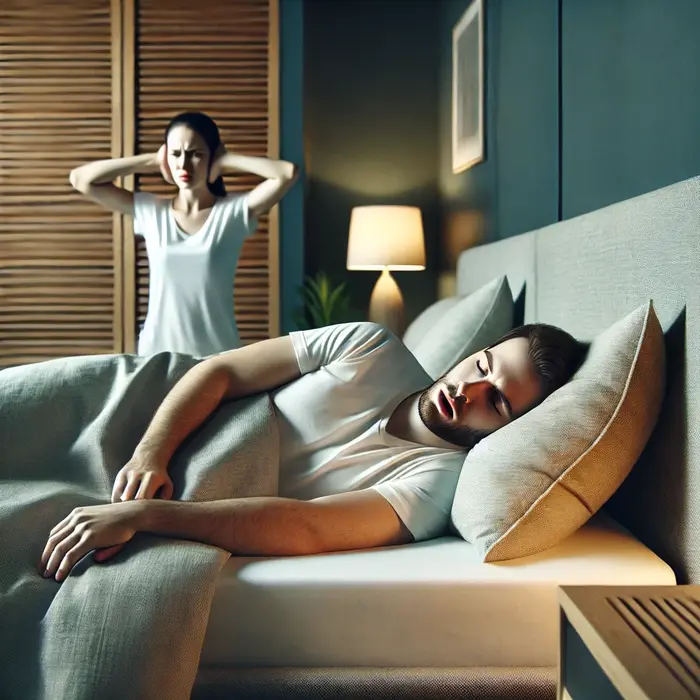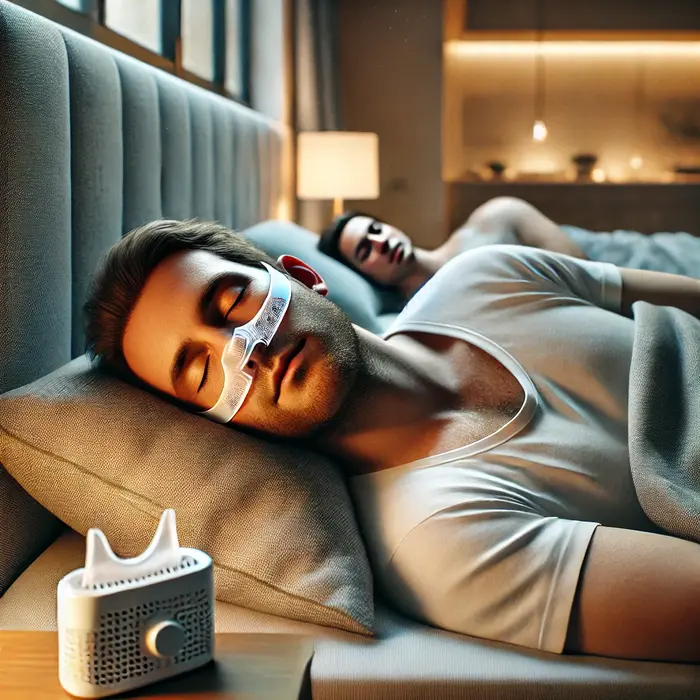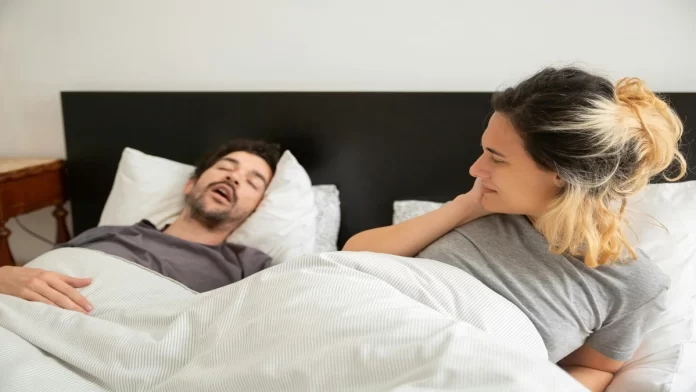A snoring problem impacts many individuals around the globe and can lead to improved sleep and better health. We will discuss several remedies for snoring and share useful guidance to ensure a restful night for you or your family, as snoring can also affect sleep quality. Read this guide if you experience snoring infrequently or suffer from chronic obstructive sleep apnea since it outlines both natural and medical options that will improve your situation and help reduce or eliminate snoring.
Why Do People Snore? Understanding the Causes of snoring
The airway can become partially obstructed during sleep, causing vibrations among adjacent tissues and creating that recognizable noise. The most frequent explanation for snoring lies in the way muscles in the throat ease and limit the airflow, contributing to the snoring sound. Obstructive sleep apnea, weight issues, and nasal congestion can also lead to snoring, which may include a deviated septum as a contributing factor that increases your risk of snoring.
Many factors lead to snoring in people, yet the main explanation for snoring frequently links back to the airway design, as snoring is a symptom of potential sleep apnea and snoring. The soft palate positioned at the back of the mouth has an important effect on snoring because it tends to vibrate during rest, resulting in vibrations. Allergies might lead to the narrowing of the nasal passage, a common cause of snoring, making breathing harder during sleep.

Adjusting your habits or lifestyle changes may help you decrease snoring.
Making some personal habits may be the initial move to end snoring and improve your sleep quality. Easy moves, including balancing your weight and avoiding drinking before bedtime, can cut down the likelihood of snoring and help you resolve snoring due to sleep disturbances. Drinking alcohol can loosen the muscles in your throat, which increases the chance they will fail during rest, causing snoring.
Adopting a predictable nightly routine may greatly support your sleep and health, potentially alleviating snoring may also improve your overall well-being. Difficulty falling asleep and varying your bedtimes may enhance snoring by letting your throat muscles slack during nighttime rest, contributing to sleep deprivation. A bedtime routine with regular hours, suggested by experts from the American Academy of Sleep Medicine, improves sleep quality and lowers snoring chances.
Natural Remedies for Snoring (Home Remedies)
Many people pursue natural remedies to treat snoring rather than conventional treatments that may reduce snoring. Many apply nasal strips that enhance breathing and expand the nasal opening, which may alleviate snoring and serve as a treatment of snoring. Sleeping with your head lifted may also keep your airway open and help alleviate snoring, which can increase your risk of snoring if not addressed.
Extracts from peppermint oil and eucalyptus can ease inflammation in the nasal passage and soft palate while possibly cutting down on snoring. Lifestyle changes like maintaining proper hydration can also benefit, as dehydration can cause thick mucus, raising the chances of snoring and making snoring worse.
Could sleeping on your side help you reduce snoring?
To reduce snoring, people commonly advocate changing your sleep position to sleeping on their side rather than their back. If you rest on your back, the back of your throat may close due to the soft palate and tongue colliding, hindering airflow and increasing snoring.
Switching your posture during sleep could help reduce or eliminate snoring and improve overall sleep quality, as loud snoring can cause disturbances for others. A few people have found creative solutions by affixing a tennis ball to the back of their nightclothes to avoid sleeping on their backs, which can help prevent snoring. Maintaining airflow while resting can also greatly lessen snoring and help you stop snoring for a better sleep experience.
Learn More: The Ultimate Guide to Starting a Carnivore Diet Meal Plan: A Beginner’s Approach
Obstructive Sleep Apnea: The Silent Cause Behind Snoring
Snoring is frequently regarded as a minor irritation; however, it might indicate a profound disorder called obstructive sleep apnea. When the airway narrows during sleep, breathing pauses, which can be a sign of a sleep disorder.
Those diagnosed with obstructive sleep apnea syndrome can have loud breathing disruptions where their breaths stop and then recover with a hurried sound, often caused by vibrations in the back of the throat. Without treatment, obstructive sleep apnea might raise the risk of heart disease and strokes, as it is often associated with loud snoring. People often rely on continuous positive airway pressure delivered by a CPAP machine to treat this issue, as it addresses the cause of your snoring.
Nasal Strips and Devices: Do They Help to reduce or stop snoring?
For soft snoring triggered by nasal congestion or obstructive sleep apnea, medications such as nasal strips can alleviate symptoms and help you stop snoring. These tools open up the nasal airway to improve breathing and lessen the chances of snoring.
A range of snoring solutions exists, from mouth tips to pillows to maintain a sleeping position. These items assist mildly to moderately snoring individuals; nonetheless, their benefits diminish for individuals struggling with serious obstructive sleep apnea.

Allergies might trigger snoring.
Allergies are frequently seen but frequently disregarded as the leading cause of snoring. If you inhale allergens like dust or pollen, your nostrils may become swollen, obstructing your airflow. Mouth breathing may arise due to this situation and raise the risks of snoring and obstructive sleep apnea.
By taking antihistamines or using nasal sprays for allergy treatment, you can decrease inflammation in your nasal and soft palate space, thereby minimizing snoring. Cleaning your bedding frequently and utilizing air cleaners can also help you maintain a free-of-allergen sleeping zone, which is important to prevent snoring.
Laser-Assisted Uvulopalatoplasty: A Modern Solution for Snoring
Should natural treatments and life improvements not prove effective, you ought to consider a surgical treatment such as laser-assisted uvulopalatoplasty. This procedure removes extra soft palate material to improve the airway and diminish snoring intensity.
Surgery is often suggested for those with mild to moderate snoring but who have not achieved success with other approaches to treat snoring. It involves a limited-invasive operation performed in a clinic and recovers fairly fast.
Palatal Implants: Can They Eliminate Snoring?
One current option for snoring includes palatal implants called the Pillar Procedure, which can help reduce or eliminate snoring. By inserting tiny rods into the soft palate, we can harden the tissue to restrict its collapse and treat snoring by preventing the airway from being blocked at night, thus reducing the snoring sound.
Even if palatal implants contribute to lessening snoring, they are not a secure fix for every person and may not address the underlying cause of your snoring, which is often related to the nose and throat. This therapy often targets individuals with slight to moderate snoring or obstructive sleep apnea who want a milder approach than usual surgery, aiming to reduce or eliminate snoring.
When to Consider Surgery for Snoring
Should you have gone through various therapies and altered your lifestyle without gaining much help, it may be important to explore surgical options. Operations, including laser uvulopalatoplasty and palatal implants, can give consistent help to sufferers of chronic snoring and help them learn how to stop snoring effectively.
When obstructive sleep apnea is severe, additional invasive interventions may be required to enlarge the airway and avert tissue collapse. These surgical approaches in clinical sleep medicine often get labelled as the last choice; they can notably boost sleep quality and total health by addressing snoring and obstructive sleep apnea.
Key Takeaways
- Solve the cause of snoring to eliminate it.
- Little alterations in daily actions, such as sleeping on your back and rotating in sleep positions, can create major shifts in your condition related to snoring.
- Working the snoring issue with nasal strips and certain pillows, as well as using anti-snoring devices, can work for some individuals to help you stop snoring.
- If your snoring persists after you try other remedies, speak with a professional about newer therapies, such as laser-assisted uvulopalatoplasty or palatal implants.
- Surgery might be the ideal treatment for serious snoring issues to expand the airway fully.
- Employing these therapies and changing your habits will help you embrace quieter and healthier sleep, which may include using dental devices as a treatment of snoring.
FAQs
What are the frequent reasons for snoring?
Obstructions to the airway during sleep are the leading factor for your snoring, as snoring occurs when airflow is restricted. Various reasons, including your anatomy and changing your sleep position, may contribute to this problem, making you likely to snore. Obstructive sleep apnea may also cause snoring and is likely to snore more frequently. Swelling of the nasal passage can arise from allergies and make breathing harder while snoring, potentially leading to sleep apnea and snoring. Moreover, activities like smoking and drinking can boost the risk of snoring.
What strategies can help me get rid of snoring? Any Remedies and lifestyle changes?
Consider using multiple methods and altering your lifestyle to lessen or remove snoring. Initially, rest on your side instead of your back because that can ensure the airway stays clear and help you learn how to stop snoring. Playing with nasal strips could boost the opening of your nasal passage and support better airflow, which may help you stop snoring and reduce snoring intensity, especially if you have sleep apnea and snoring. Staying at a normal weight and not drinking alcohol before bed may also help you stop snoring. If these techniques prove ineffective, contact a doctor for guidance on alternatives such as CPAP therapy or laser-based procedures that target snoring and obstructive sleep apnea.
What habits can I make to Stop snoring?
Changing your lifestyle, in particular, helps reduce snoring. Avoiding heavy drinking and tranquillizers at night, combined with decreasing weight when you are obese, is key to avoiding sleep deficiency and may help alleviate snoring intensity. Furthermore, setting up a pleasant sleeping area may assist you; look into using a humidifier to alleviate nasal congestion and ensure your airway is free, which may reduce snoring. Practising sound sleep routines and keeping your fluids up is vital for lessening snoring, as dehydration can contribute to the surrounding tissues vibrate during sleep.
Do allergies cause snoring?
Snoring is greatly affected by allergies, which can cause inflammation and increase the risk of snoring and obstructive sleep apnea. Allergens, including dust mites and pet dander, can inflame and congest the sinuses, limiting breathing at night. The blocked airways can result in snoring. Using medication and removing allergens with air purifiers promotes relief from these symptoms and lowers snoring.


